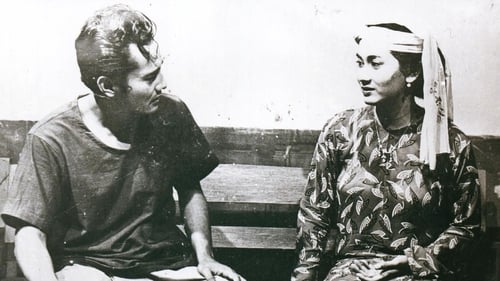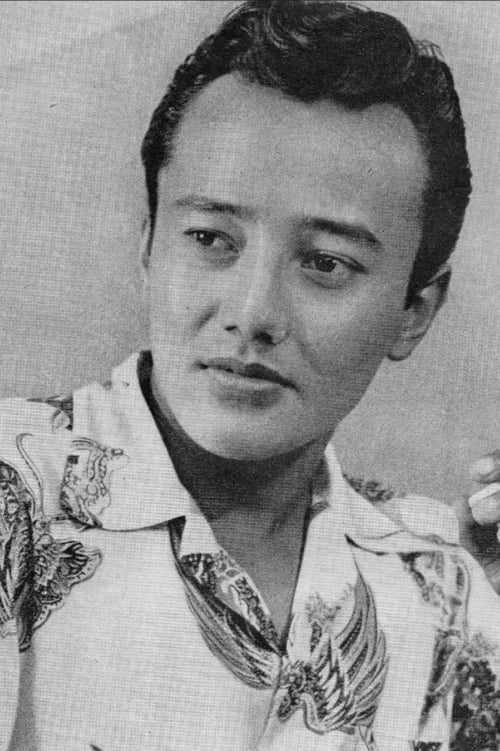Bambang Hermanto
Nacimiento : 1931-08-11, Surakarta
Muerte : 1991-12-18
Historia
Bambang Hermanto was a prolific Indonesian actor in the 50s. He became well known after acting in Harimau Tjampa (1953). Bambang was dubbed the 'Indonesian John Derek', given the similarity of his face. He won the Best Supporting Actor award in FFI 1955 for his role in Lewat Djam Malam (1954).

Hakim
A melodramatic suffer-fest that would give Lars von Trier pause. On a quest to find her biological father, teenager Yeni is sidetracked when she's raped by her stepfather and ends up in a nuthouse. After she's released, her prostitute sister takes her to work at a brothel. There, she becomes second wife to an old, miserable man until her stepfather returns and tries to lay claim on her. After unsuccessfully trying to strangle Yeni to death, he and Yeni's mother get in a fight and end up stabbing each other to death. Once Yeni finds out she's pregnant, she's then rejected by her miserly husband, who denies the child is his.

Directed by Sjuman Djaya.

Hamidah, who is Budi’s childhood friend and his sweetheart as a grown up, has to leave him to treat her illness. Left without any news of his love, Budi is disappointed and becomes a reckless man who plays around with women and goes drinking in nightclubs. Then he becomes a police fugitive after a fight with another man

Andi is a newspaper hawker who is honest and kind-hearted. One day he was helping a sick grandfather. The grandfather gave Andi a magical necklace. When the necklace was kissed, Andi turned to Rama who has superhuman strength and can fly. One of the customers of the newspaper Andi is Lia. Lia's father was a professor who invented a new explosive. Black Dragon group trying to steal the explosives formula. Lia and her father helped Rama to capture kingpin Black Dragon. (via Google Translate)

Captain Bitah

Medasing
Follows a young woman who is kidnapped by a group of bandits, only to fall in love with their leader.

Sersan Mayor Imron
Devoted to the heroes who fought for their homeland’s freedom in the 1947 Indonesian war of liberation.

Imansyah
An Indonesian musical that comedically depicts of complex coming of age problems within a girl's dormitory, lead by Mrs. Siti.

Sumantri
Mr. Prawiro, a retired (district chief) assistant, lives in Kebumen village, his hometown. His eldest daughter, Indrani, marries Sumantri, a staff in “Bank Tabungan Pos”. In a meeting, Mr Prawiro suggests that the importance for saving money needs to be stressed.

Armansyah Perkasa Alam
Armansyah Perkasa Alam, a rising movie and radio star, receives a lot of fan letters that he uses to indulge his playboy behaviour. His friend, Trisno, keeps cautioning him to no avail. Armansyah begins to juggle too many appointments with too many girls. Finally, all eight girls that he is trying to seduce realise his trick and they all leave Armansyah.

Set during the period after the war of independence when many rogue gangs try to control different areas,

This film, produced in Indonesia and based on the old Japanese folk saying that "a man's happiness depends upon a knife, house, horse, wife, and singing bird," tells the story of the restoration of a young man to his rightful place in his society and nation, and depicts basic Indonesian traditions while outlining Indonesia's successful fight against malaria (with U.S. cooperation). The film follows Amin, a village youth who attempts to earn a living in the city. However, he is unsuccessful, and so he returns to his village to live with his wife-to-be, Marlina. Before the couple can marry, Marlina falls ill with malaria, and only after she is cured are they able to wed. The film was directed by Miriam Bucher and is a joint production of the U.S. Information Service (USIS) and Produksi Film Negara (PFN).

In school, Laila goes steady with Hamid. Her father, Abdullah the trader, opposes their relationship as he thinks it will hamper her education. When told to study at home, Laila is still trying to meet her boyfriend. One day, Abdullah is on the brink of bankruptcy. Then Usman, the tycoon, comes along and helps him. So Abdullah feels obligated to give his consent when Usman proposes to marry his daughter. But Laila is treated badly by her in-laws so she runs away, without knowing that her father has died. Fortunately, she encounters Hamid, and together they live happily ever after.

Puja
A hero of revolution returns to civilian life to find the new society very different from the ideals he fought for.

Dullah
Prior to his death, Mutalib tycoon ordered his son Dullah to search for a legacy that is listed on the secret map. Fearing that his son, who had been studying abroad, knew only the truth, Mutalib asked his friends, Cepot and Udel to help and guide his son, including being told about the secret map. Joko, the deceased's assistant, is trying to seize the map with the help of Mutalib's private secretary, Fatimah. Udel and Tjepot were kidnapped and threatened by Jim. Udel and Tjepot fled to Sukadamai. This run was made funny. Joko successfully snatched the map from the Dullah and went to Sukadamai which was the clue to the inheritance. Thanks to the help of Udel and Tjepot, the Dullah was able to find the treasure. What is the content of that inheritance? Just a piece of paper urging Dullah to work. The insane Dullah who wanted to work hard after getting the message, also fell in love with the local girl, Siti.

Mulyono
Jakarta experiences a rapid growth after Indonesia gains full sovereignty in 1950. The Republic’s capital becomes the city of hope and dreams for people living in rural areas. One of them is Mulyono. He leaves his wife and kids in the village. But Jakarta turns out to be a horrible city and Mulyono has bad luck until he finds work at a gas station. One of his customers is Nani who asks him to work at her father’s office. Soon, they become husband and wife and Mulyana forgets about his family back home.

Lukman
Set in the 1930s, and narrated like a ballad from the past, "The Tiger from Tjampa" tells of how a young man, Lukman, seeks to avenge his father’s murder by learning pencak silat, a traditional form of self defence, based on the movements of animals.




